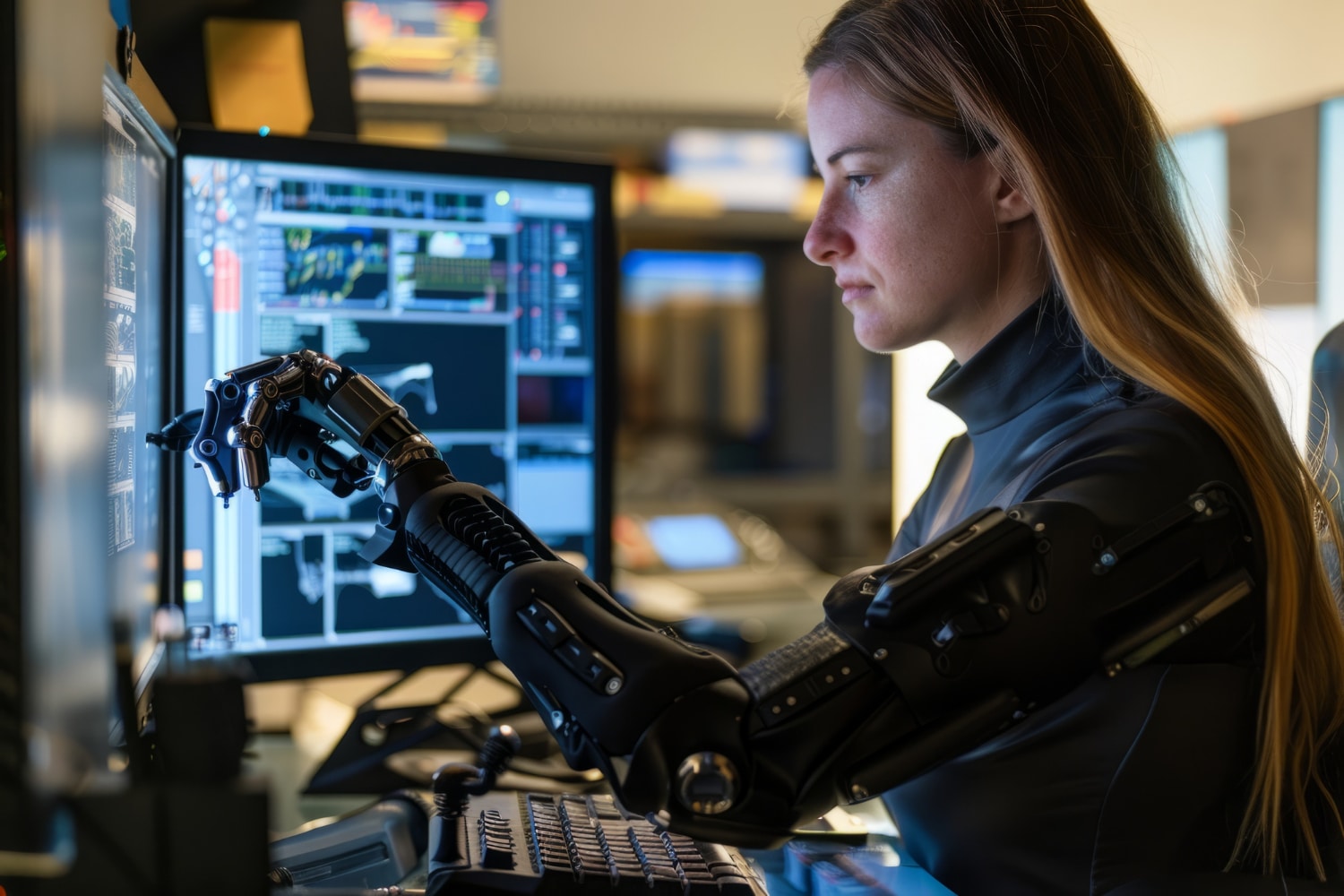In 2024, the profession of artificial intelligence engineer continues to generate strong interest due to its crucial role in digital transformation and technological innovation. AI engineers are sought after across various sectors such as healthcare, finance, and industry for their expertise in machine learning and deep learning.
These professionals contribute to developing autonomous systems capable of making real-time decisions and learning new tasks. But what income can one expect as an AI engineer in 2024?
What does an AI engineer do?
An artificial intelligence (AI) engineer is an expert in advanced technologies, specializing in designing, developing, and deploying systems that simulate human intelligence. This professional possesses advanced skills in machine learning, deep learning, and predictive algorithms to create intuitive business solutions. Working across various sectors, such as healthcare, finance, industry, or transportation, the AI engineer helps optimize numerous processes through automation and extensive data analysis.
They also participate in designing innovative applications like computer vision, natural language processing, and neural networks, thereby shaping the future of technology.
Roles and Missions in Companies
In their daily work, the artificial intelligence engineer plays a vital role in creating innovative and high-performance solutions tailored to company needs. Their primary missions include:
- Needs Analysis: They closely work with business teams to understand and translate functional needs into detailed technical specifications.
- Development of AI Models: With their mastery of machine learning algorithms and advanced techniques like deep learning, they design models that enable automating complex tasks.
- Testing and Validation: Before integrating models into production systems, the AI engineer conducts thorough testing to ensure their robustness and effectiveness in solving real-world problems.
- Performance Optimization: Once deployed, they continuously monitor models’ performance and adjust algorithms if necessary to ensure optimal results.
- Interdisciplinary Collaboration: They collaborate with software engineers, data scientists, and other professionals to ensure seamless integration of AI solutions into the company’s existing systems.
These missions position the AI engineer as a strategic asset for any organization striving to leverage artificial intelligence to gain competitiveness and operational efficiency.
What is the salary of an AI engineer?
The salary of an artificial intelligence engineer depends on several factors, including experience, industry sector, and geographic location. In 2024, engineers specializing in machine learning and AI benefit from attractive compensation, reflecting the increasing demand for their technical skills.
Summary Table
| Experience | Annual Gross Salary |
|---|---|
| 0-2 years | €35,000 - €45,000 |
| 2-5 years | €45,000 - €60,000 |
| 5-10 years | €60,000 - €80,000 |
| 10+ years | €80,000 - €120,000 |
Average Salary of an AI Engineer in France and Internationally
The average salary of an AI engineer in France ranges from €45,000 to €70,000 gross annually. Internationally, particularly in the United States, salaries are much higher, with AI engineers earning between $100,000 and $150,000 per year. These differences are partly due to local market dynamics and leading tech companies, like GAFAM (Google, Amazon, Facebook, etc.). It’s important to note that the cost of living, especially in cities like San Francisco, can also justify these differences.
Factors Impacting an AI Engineer's Salary
Experience and Technical Skill Level
Experience is a key factor in determining an AI engineer’s salary. The more years of practice a professional has, the more their expertise is sought after, especially if they have worked on complex projects integrating cutting-edge technologies such as deep learning or natural language processing. Engineers who possess specific technical skills, like mastery of TensorFlow or PyTorch frameworks, and who are up-to-date with AI advancements, enjoy higher salaries.
Industry Sector
The sector in which the AI engineer works plays a crucial role in compensation. For example, in healthcare, AI engineers contribute to major advancements in predictive diagnostics and personalized medicine, justifying competitive salaries. In finance, they are involved in risk management or fraud detection projects, often with very attractive salaries. The automotive sector, particularly with the development of autonomous vehicles, also offers very interesting salaries for engineers specialized in computer vision or autonomous driving.
Geographic Location
Geographic location has a major impact on salary. In Paris, an AI engineer can receive a salary that’s €5,000 to €10,000 higher annually compared to a professional working in the provinces, due to the cost of living and the concentration of large technology companies. International salaries, particularly in the United States, are often significantly higher, especially in tech hubs like Silicon Valley or New York. However, it is essential to consider the cost of living in these areas to evaluate the real purchasing power.
What skills increase the salary of an AI engineer?
An artificial intelligence engineer’s salary depends not only on their experience but also on the specific skills they possess. These skills, whether technical or relational, significantly influence compensation in this rapidly growing field.
Programming Languages and Tools
Mastery of programming languages is crucial for an AI engineer. The most sought-after languages in the field are Python, which is often used for creating machine learning models, as well as R, Java, and C++. In addition to languages, a deep knowledge of development tools like TensorFlow, PyTorch, and Keras is particularly appreciated by employers. These tools are used for the creation and training of advanced AI models, and mastery of these technologies can significantly increase an engineer’s salary.
Mastery of Machine Learning and Deep Learning Algorithms
An in-depth understanding of machine learning and deep learning algorithms is a major asset that influences the salary of AI engineers. These professionals must be capable of designing and optimizing complex models based on these algorithms to solve specific problems, whether it’s prediction, classification, or regression. Engineers who are proficient in advanced concepts such as neural networks, generative models, or even optimization algorithms are often the ones who attain the highest salaries.
Expertise in Big Data, NLP, and Computer Vision
With the exponential growth of data, expertise in Big Data has become an essential element for AI engineers. Those who can handle and analyze massive data volumes with technologies like Hadoop or Spark see their market value significantly increased. Moreover, specialization in areas such as natural language processing (NLP) and computer vision is also highly demanded, especially in sectors like healthcare, transportation, and technology. This rare expertise can lead to higher salaries, especially for those developing innovative applications like voice recognition or object detection.
Soft Skills: Teamwork, Communication, and Leadership
Beyond technical skills, soft skills play a significant role in the compensation of AI engineers. Teamwork and communication skills are essential because these professionals often collaborate with interdisciplinary teams, including data scientists, developers, and project managers. Engineers who can effectively communicate their technical ideas to non-specialists and who have good leadership to manage complex projects or lead teams see their salaries increase. Indeed, the combination of technical and personal skills is a highly sought-after asset in this field.

How to become an AI engineer?
Becoming an artificial intelligence engineer is a demanding but rewarding journey that requires solid academic training as well as specific technical skills. AI engineers play a central role in designing and developing intelligent systems, and their expertise is sought after in many sectors.
Required Studies
To become an AI engineer, a Master’s degree in computer science, artificial intelligence, or data science is generally required. These degrees offer a strong foundation in algorithms, mathematics, and machine learning, which are essential for working in this field. Master’s programs in AI often include specialized courses in deep learning, natural language processing (NLP), and computer vision, which are crucial for mastering cutting-edge technologies in the field.
In some cases, employers may prefer candidates with a PhD in artificial intelligence or cognitive science, particularly for research and development roles.
Certifications and Additional Training
In addition to university studies, professional certifications can enhance a profile and make a candidate more attractive to employers. Platforms like Coursera, edX, or Udacity offer certifications in machine learning, deep learning, and applied artificial intelligence. These courses provide practical experience with tools and technologies used in the industry, such as TensorFlow and PyTorch.
Furthermore, recognized certifications like those from Google or Microsoft AI can help you acquire specialized and up-to-date skills in artificial intelligence technologies.
The DataScientest Training
The DataScientest training is a top choice for those looking to specialize in artificial intelligence. This program offers a comprehensive course in bootcamp format (5 months), continuous training (18 months), or part-time (1 to 2 years) that covers key areas like machine learning, deep learning, and predictive algorithms. Through a practical case-based approach, participants acquire concrete skills that are directly applicable to the professional world. The flexibility of this course also allows participants to balance learning with professional activity, a major advantage for engineers retraining or looking to deepen their skills in AI.
What is the future for the salaries of AI engineers?
The profession of an artificial intelligence engineer is in constant evolution and its salary prospects are more promising than ever. As AI expands into new sectors, the demand for high-level experts continues to grow. But what are the forecasts for salaries in the coming years? What are the possible career developments? We explore future prospects for AI engineers here.
Possible Career Developments
Artificial intelligence engineers can quickly move into management roles, particularly with a few years of experience. Career progression opportunities include roles such as AI Project Manager, AI Architect, or even Director of AI Research. With the rise of automation and AI solutions in various sectors, these roles become crucial for companies looking to innovate and modernize. Generally, these management positions come with a significant salary increase, with levels exceeding €100,000 gross annually for experienced engineers in these roles.
Growth Prospects in the Coming Years
Salaries in the field of artificial intelligence are expected to continue to grow in the coming years. According to several market studies, the demand for AI engineers is set to intensify, particularly in sectors like healthcare, energy, and transportation, where AI plays an increasingly central role. The digital transformation of businesses and the development of technologies such as 5G or edge computing will contribute to reinforcing this trend. Consequently, engineers specializing in machine learning and deep learning are expected to continue benefiting from regular salary increases, with forecasts often exceeding 10% annual growth in some tech industries.
New Challenges and Opportunities in the Profession (Ethical AI, Security, etc.)
Artificial intelligence engineers will also face new challenges in the coming years. The rise of ethical AI, data security, and the need to develop transparent and responsible AI systems open new specialization opportunities. For example, more and more engineers are turning to roles focused on designing ethical AI systems or implementing robust protocols to protect user data. These specialized skills, particularly sought in regulated industries such as finance or healthcare, can offer higher pay and allow engineers to play a key role in the transition to more secure and inclusive AI.










